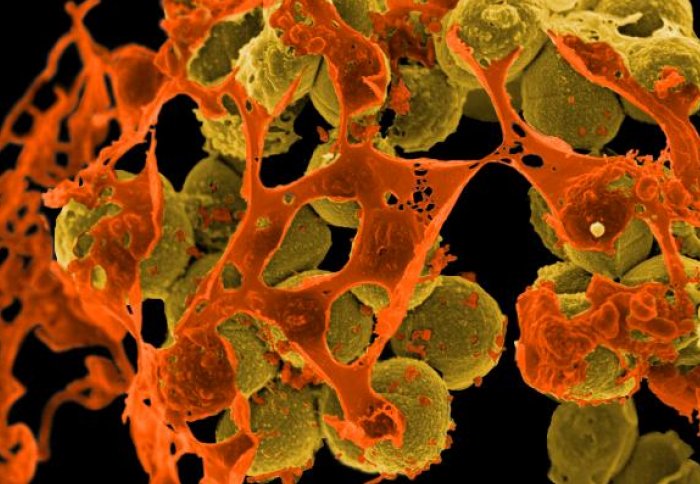£2m grant aims to tackle the threat of antimicrobial resistance in surgery
by Ryan O'Hare

The research aims to reduce the burden of infection from drug resistant bugs, such as MRSA (pictured)
Imperial researchers have received a funding injection to help tackle the threat of drug resistant microbes for patients undergoing surgery.
The international, multidisciplinary team, led by Alison Holmes, Professor of Infectious Diseases at the College, has been awarded a £2 million grant from the Antimicrobial Resistance Cross Council Initiative supported by the seven research councils in partnership with other funders.
The funding will be used to investigate how antibiotic use can be optimised in surgery to address antimicrobial resistance (AMR) and minimise the burden of surgical infection.
Infection after surgery is a growing global concern with 23 million surgical site infections leading to two million deaths each year
– Professor Alison Holmes
Professor of Infectious Diseases
The work will see Imperial’s Faculty of Medicine and Business School working together with experts from King’s College London, University of Leicester, University of Hertfordshire, Royal College of Anaesthetists, University of Cape Town in South Africa, the Amrita Institute of Medical Sciences in India, and University Teaching Hospital of Butare in Rwanda to tackle this global problem.
Commenting on the announcement, Professor Holmes said: “We are delighted to have been awarded this funding to address such an important topic. Large amounts of antibiotics are used worldwide related to surgical procedures, both to prevent infection and to treat post-operative infections.
“However, the number of infections for which antimicrobials no longer work is rising and also infection after surgery is a growing global concern with 23 million surgical site infections (SSIs) leading to two million deaths each year.”
The grant, which started in May 2017 and will run for four years, is part of a larger project that aims to expand understanding of how the behaviour of the public, professionals and organisations can impact on AMR, as well as how they can be influenced to reduce the burden of AMR.
Pooling expertise
The project brings together expertise from a wide range of disciplines, including infectious diseases, pharmacy, nursing, surgery, health economics, psychology and policy, to address key drivers of AMR along the entire surgical pathway.
In addition to improving clinical outcomes, the team aims to build research capacity in India, South Africa and Rwanda by supporting the development of junior researchers.
Professor Marc Mendelson, lead investigator at University of Cape Town, said: “Untreatable bacterial infections in surgical patients are already a reality in South Africa. The strength of this project in bringing together multi-disciplinary researchers from disparate fields of science is exactly the model that will be needed to inform our understanding and aid the implementation of change to optimise antibiotic use in the vulnerable surgical population.”
Untreatable bacterial infections in surgical patients are already a reality in South Africa
– Professor Marc Mendelson
University of Cape Town
Professor Holmes added: “Better targeted use of antibiotics – the right drug, at the right time, for the right duration – can help to prevent surgical infections, but the decision making processes around this and the optimal management and prevention of post-operative infection are complex.
“The surgical setting provides the ideal place to undertake research on the behavioural aspects of infection management and the drivers of antibiotic use in surgery. Whilst India, South Africa and Rwanda will be the primary beneficiaries of this work, these matters are all too common a problem in UK hospitals too. We look forward to learning from each other over the next four years.”
For more information, visit the ESRC website.
This article is adapted from materials provided by the ESRC.
Image: Methicillin-Resistant Staphylococcus aureus (MRSA) Bacteria (Credit: NIAID)
Article supporters
Article text (excluding photos or graphics) © Imperial College London.
Photos and graphics subject to third party copyright used with permission or © Imperial College London.
Reporter
Ryan O'Hare
Communications Division